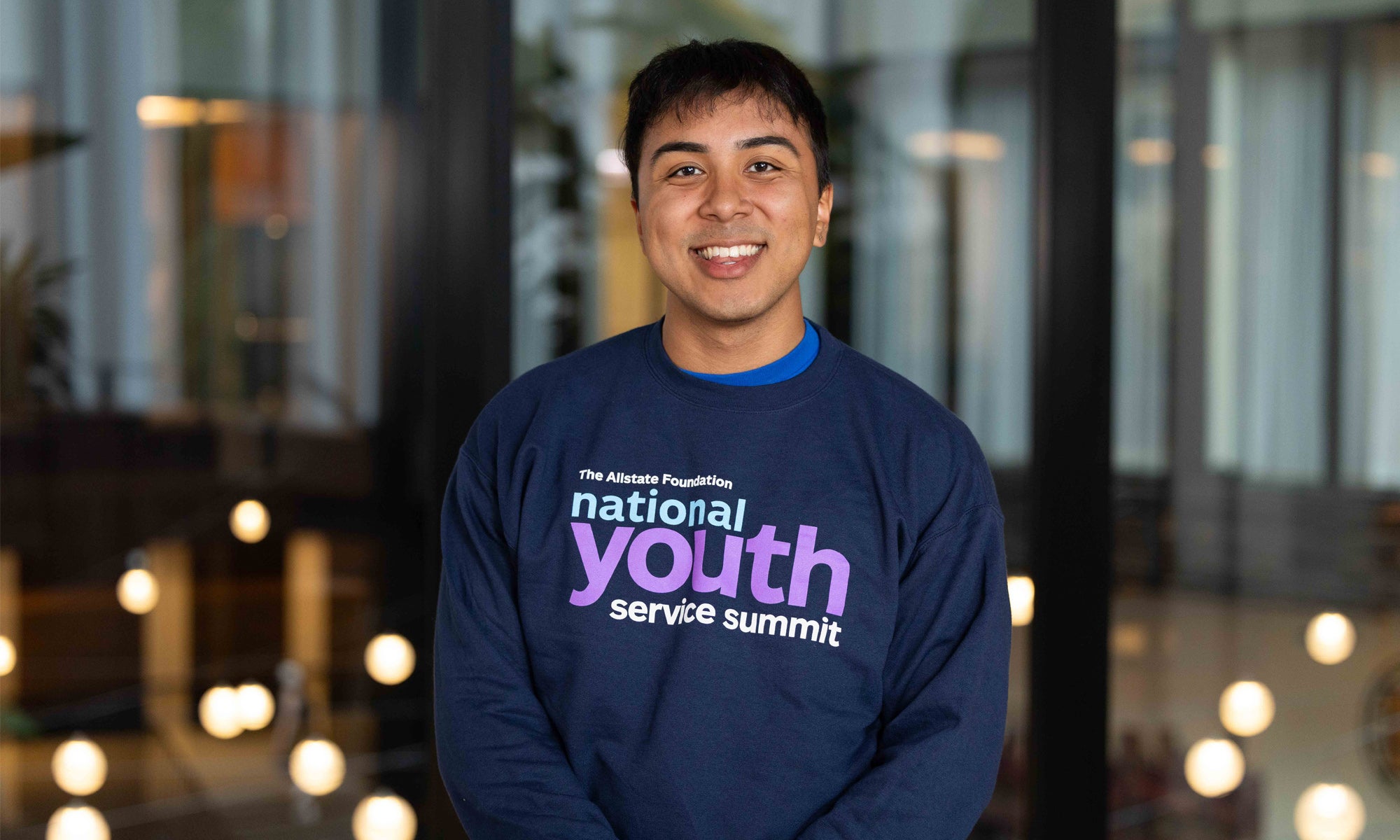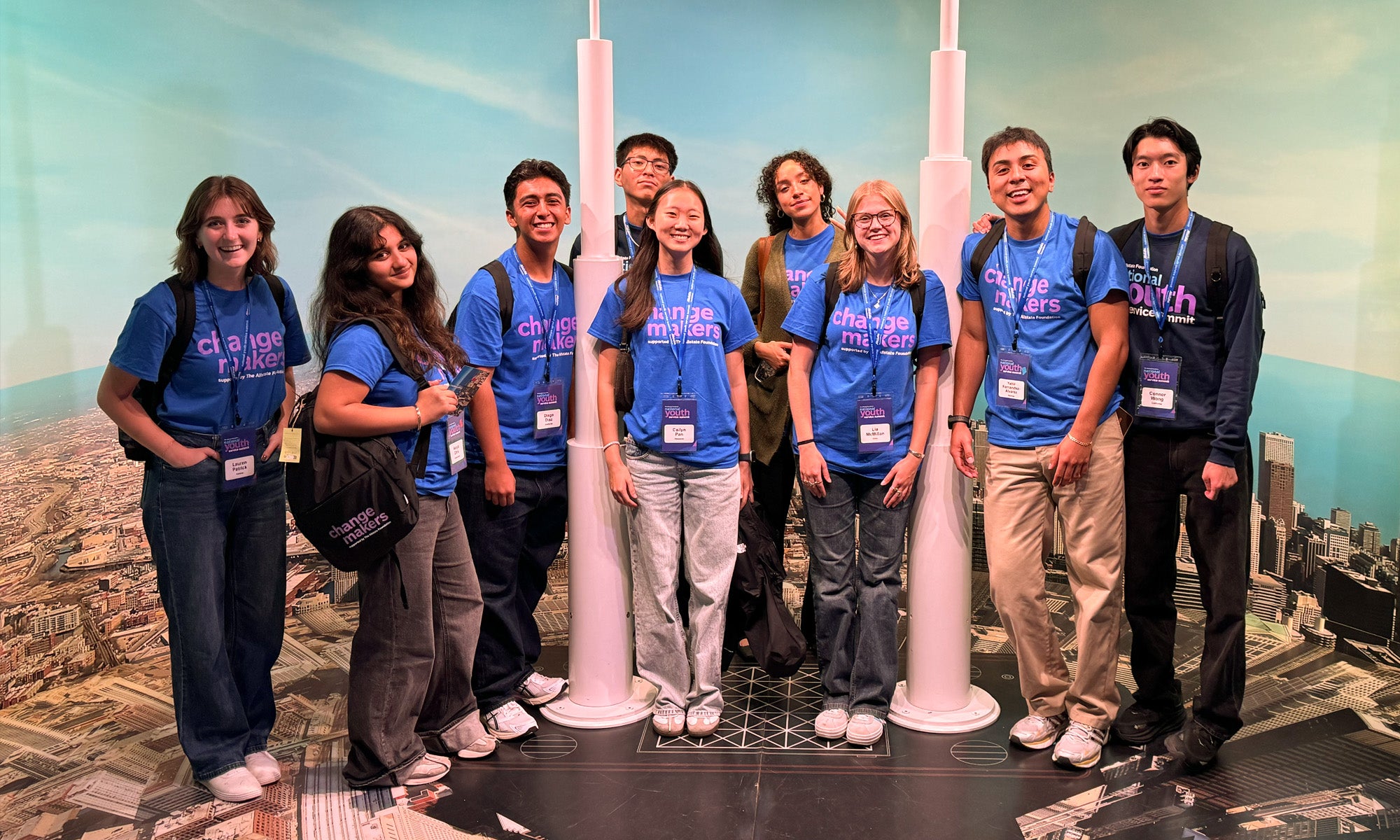
This September, Yahir Fernandez-Alvarez ’26 traveled to Chicago for the Allstate Foundation National Youth Service Summit.
A religion major, Fernandez-Alvarez is passionate about educational equity and works to create programs that support students from underrepresented backgrounds. He is involved in service organizations such as Big Brothers Big Sisters, where he mentors youth and supports their educational pathways, as well as La Fuerza Latina, a campus organization committed to illuminating and advocating for Latine communities.
Being selected as one of only 65 students nationwide to attend the Allstate Foundation Summit is a significant achievement, said Dana Pursley, Denison director of community leadership and involvement. “Yahir was selected from a highly competitive pool of nearly 1,200 applicants across the nation. These applicants represent the very best of young leaders in the United States who are at the forefront of driving positive change in their communities.”
Fernandez-Alvarez shared reflections on his experience in this Q&A.

Yahir Fernandez-Alvarez ’26 (second from right) with fellow attendees at the Allstate Foundation National Youth Service Summit in Chicago.
What did you do at the Youth Service Summit, and how did it impact you?
Overall, this experience has reminded me about my “why.” Why do I choose to help others? As the son of immigrant parents from Mexico, I feel immense gratitude for their sacrifices that gave me opportunities in the United States. The Summit reinforced my passion for change and representation within my community in Kansas City, Kansas, and my belief that real change is possible when collaboration occurs. As young individuals, we all have the power to build a better future through connections and purposeful intentions.
I met national leaders, including former U.S. Surgeon General Dr. Vivek Murthy, Allstate Corporation CEO Thomas J. Wilson, and TIME CEO Jessica Sibley. Hearing their personal stories and insight into what leadership represents was truly inspiring.
Participating in skill-based workshops prompted me to reflect on the service journey and goals I want to accomplish in the following months.
Working in small groups, I helped develop a service project in a nonprofit design challenge, and participated in discussions that allowed me to listen and collaborate with other peers who were just as passionate about service as I was.
Tell us about your passion for educational equity.
My passion for educational equity comes from my experiences and the sacrifices my parents made for me to have access to education. As the child of immigrant parents, I witnessed the challenges many of my peers faced within the U.S. education system.
Attending a Title I high school, I noticed how socioeconomic barriers, language differences, and limited resources made it difficult for many to succeed academically. For some of my classmates, education could not be their main priority due to the hardships they faced at home.
My mother instilled in me the importance of education as a pathway to success. Her support taught me the power of education and the opportunities it provides. These experiences have ultimately shaped who I am today and made me determined to make sure that no student is left behind due to their background. Education creates opportunities for those who never had the chance to achieve their full potential.
How have you supported students from underrepresented backgrounds?
My first experience was as an intern and volunteer at Tyler’s House for Teens, a nonprofit in Kansas City. I mentored young adults and helped them explore their passions through creative arts. A lot of the students I interacted with were at-risk teens who needed mentorship and guidance. As a role model, I saw the impact I had on them when I listened to their experiences and became a mentor to them.
I’m also a community service intern with Big Brothers Big Sisters of Licking & Perry County, where I work with underrepresented students and different program coordinators. I provide support for program coordinators in different elementary schools around the central Ohio region and complete paperwork. As an intern last semester, I tutored elementary school students who struggled with literacy skills and became a mentor to them.
At Denison, a group of my peers and I from the Scholar-Leader cohort have begun developing an initiative that makes applying to college easier for high school students. Through different focus groups and assessments, our group has identified challenges such as time management, academic transitions, and social adjustment to college and we are currently creating scaffolded lesson plans and mentorship opportunities to help students in the central Ohio community succeed in higher education.
How is this work reflected in how you approach your major?
Studying religion has prompted me to explore difficult questions pertaining to ethics and social responsibility, which can be connected to equity work.
A major influence on my academic career at Denison was Dr. David Woodyard, whose teaching of liberation theology influenced my perception of social justice. He taught me that faith and social justice shared a common theme: empowering and challenging systemic oppressions in society.
The religion department has also equipped me with the skills to understand many different traditions. It has taught me how religion functions in the lives of individuals and global communities. Ultimately, it has allowed me to identify how religion shapes cultures, lives, and broader systems such as education.
Can you share your post-graduation plans?
After graduation, I plan to look for opportunities that pertain to education or public service. I have applied to the Fulbright English Teaching Assistant Program in Peru. This opportunity would allow me to gain teaching experience and build connections with locals. Currently, I am also applying to other programs related to English education and government work, which will allow me to have a direct impact on communities. Particularly, I would like to work in a job related to educational access and equity. A few years after graduation, I plan to apply to law school.